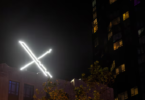BRUSSELS (AFP): The European Space Agency on Monday proposed a competition between European firms to build a ship that would deliver cargo to the International Space Station.
The project will require “transport, docking and re-entry capability, something Europe does not possess today,” ESA chief Josef Aschbacher told the opening of a two-day summit of European space ministers.
The summit, held in the Spanish city of Seville, comes at a difficult time for European space efforts.
With delays to its new Ariane 6 rocket, Europe has no independent way to blast its missions into space. It also faces stiff competition in space from the United States, China and private companies — as well as rising players such as India.
Aschbacher proposed “a competition between innovative European companies” to develop a service that would transport cargo to the ISS by 2028, then bring it back to Earth.
“The service vehicle could later evolve to a crew vehicle and serve other destinations beyond low Earth orbit,” Aschbacher added.
The summit comes as Europe tries to determine the scale of its ambitions in space.
In April, experts in a report commissioned by the ESA called for Europe to establish a “sustained presence” on the surface of the Moon.
A source close to the negotiations told AFP that “if we want to carry out manned flights, this is the first step.”
“You have to be able to send a cargo ship to a station and come back. That is the first brick,” the source added.
Aschbacher said that “public funding for the initial phase has already been secured and will be complemented with private contributions”.
– Rocket problems –
The competition could foreshadow a new approach from the ESA based on the model of US space agency NASA, which would involve buying launches from manufacturers rather than Europe developing its own such programmes.
Monday at the summit is devoted to a meeting of ministers from the 22 ESA member states, which includes most European Union nations as well as the UK, Switzerland and Norway.
However notably, the space ministers of France and Germany — the two biggest contributors to the ESA — did not attend.
In a statement, the ESA said in a statement said it would “harness space for a greener future”.
Last week, the ESA and the European Union agreed to join forces to accelerate the use of Earth observation missions to collect climate change data.
The thorniest subject for the summit is Europe’s lack of rocket launchers — the ESA has previously relied on Russia or the US to launch its astronauts into space.
Already delayed by four years, Europe’s next-generation Ariane 6 rocket is now not scheduled to make its maiden flight until next year.
The smaller Vega C launcher is still grounded after the failure of its first commercial flight in December.
And Europe lost access to Russia’s Soyuz rockets after Moscow invaded Ukraine last year. In July, the ESA was forced to use a rocket from billionaire Elon Musk’s SpaceX to launch its Euclid space telescope into space.







